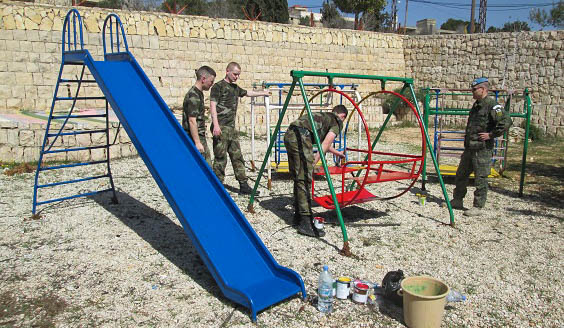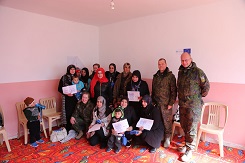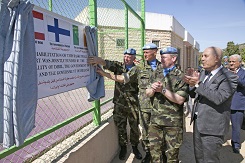Civil Military Cooperation in Lebanon

Civil Military Cooperation (CIMIC) is communication between the military forces and the surrounding society, with the aim of establishing and maintaining good relations and stability and bringing the state of the surrounding society to the attention of a commanding officer.
The term CIMIC had not yet been formed when UNIFIL, since its inception in 1978, adopted a humanitarian attitude to the surrounding society. Also Finns have been assisting the villages of their region since the beginning of their presence in UNIFIL. For example, in the 1990's, the Finnish Battalion Hospital treated local inhabitants and nearby villages were assisted by sending work machines with drivers to assist in municipal building work.

In the UNIFIL operation, CIMIC is part of a wider policy aimed at establishing the best possible relationship between the military organization and the surrounding civilian world and balancing the South-Lebanese society. UNIFIL emphasizes CIMIC by forwarding the role of local government and the education system, improving the basic services of the local population (education, water, health and electricity), strengthening confidence in the future and taking environmental concerns into account.
The CIMIC organization strives for such a good cooperation with the various actors that potential aid projects and other cooperation will not overlap, but the activities complement each other. This will contribute to a fair distribution of joint projects to local society.
UNIFIL’s Civil Affairs, alongside CIMIC, is supporting the South-Lebanese community. It assists regional organizations, facilitates the creation of links between different organizations and advises foreign donors in projects in South Lebanon. The Civil Affairs also organizes various events such as mine safety lectures, women's day events and children's spring festivals.
Quick Impact Projects (QIP)

One CIMIC activity is small-scale projects that support local society (Quick Impact Projects, QIP). The duration of the project must not exceed three months, so the contractor's reputation is important. When the project is completed, the municipality leaders will hold an opening ceremony with representatives of media.
Funding for Quick Impact Projects will be either from the United Nations through the UNIFIL Headquarters or from the participating states of UNIFIL. The annual national funding allocated to CIMIC projects varies between zero and one and a half million euro.
The Battalion's CIMIC office employs two Finns and two Irish soldiers.
– This office is genuinely multinational, as we work as a team where everyone is aware of everything. The language of the office is English and the Irish Deputy Chief acts as my substitute, the head of the Office Major Kari Danielsson says.
Different modes of action help CIMIC groups to create a good picture of the situation of their villages in their area.
– Our work includes, among others, various teaching events from first aid training to language courses. We also participate in local events such as school celebrations. This shows that we are interested in local life and respect the surrounding culture. We also support Quick Impact Projects. In 2016, we participated in about 15 contracts, which included, for example, water treatment systems, refurbishing roads and organizing training and recreational activities for women, children and young people. During 2017 support will be given to infrastructure projects such as water supply, lighting and waste management, and the renovation of sports facilities, Danielsson explains.
In the latter part of the year, the fund application was sent to Finland and negotiates with the mayors of possible projects. During the spring, funding is secured so that we can choose the ones to be implemented. In the summer and fall the projects are ongoing. The opening ceremonies will be held during the next spring. The financial involvement of local authorities ensures the need for a project and the reasonableness of its cost with respect to the local price level.
– First aid training, English language courses, football camps and various events for children and young people have been very popular and have helped us build a good public image of our battalion among local people. There is lot of interest in these. I remember when, after the end of a Finnish briefing, the children encircled our local interpreter in questioning details of Finland, Danielsson tells.
– Actually, all the soldiers are doing CIMIC work while visiting local villages, talking with people and visiting coffee houses. Communicating with local people reduces suspicion and allows the parties to see each other as ordinary people, Danielsson emphasize.



